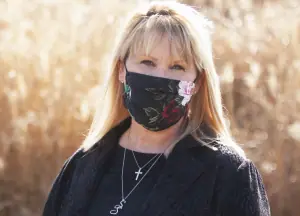
If you’d asked Susan Passariello four or five months ago if she’d consider getting the COVID-19 vaccine, she would have quickly said no way. Simply put, it wasn’t something she wanted or needed. Fast forward to today, and she’s encouraging everyone to get vaccinated — especially after watching helplessly as she and her entire family struggled with the virus.
“As soon as I can take it, I’m taking it,” the Argyle resident said. “[COVID] is not a fun thing to go through. It hit us hard.”
The last few months have been a whirlwind for the entire Passariello family. Her 80-year-old father, Jim Nix, unknowingly contracted the coronavirus while in a nursing home and died on October 21.
Before his death, one of Susan’s sisters, who works in Spiritual Care at Houston Methodist Sugarland Hospital, transported Jim to a hospital in the Houston area for dementia treatment and got sick. Before her sister knew what was going on, she’d spread the virus to her family and ultimately found herself in an isolation room at the hospital.
Two days after Christmas and while still at home, Susan and her husband, Stephen, fell ill — despite months of taking vitamins, wearing masks, using hand sanitizer, and being cautious with their every move.
It was a domino effect, the likes of which Susan never anticipated.
“My dad suffered a great deal, and it was horrible watching that unfold,” Susan said. “On top of that, [the virus] went through our family. I have no clue how I got it. I hadn’t been inside a grocery store since March. I wasn’t going into the office regularly. We were wearing masks, using hand sanitizer, going to church online — and I still got it.”
Susan is far from alone. Denton County Public Health confirmed in late January that the county alone had surpassed 50,000 confirmed infections since the pandemic started last year. That includes regular families like the Passariellos all the way up to brave first responders, hard-working frontline hospital staff, and dedicated public officials like Denton County Judge Andy Eads, who has been extremely transparent about his own battle with the virus.
Residents have been showing up in droves to sign up for the COVID-19 vaccine waitlist that launched in January. Within the first hour and a half that the portal was live, more than 6,500 residents signed up. That number ballooned to well over 100,000 a week later and has continued to skyrocket. In the meantime, an increasing number of people continue to do their due diligence in recognizing symptoms, washing their hands, adhering to social distancing guidelines, and getting tested.
“I really feel like the end is in sight — that there is a light at the end of the tunnel, and it’s not a train,” Eads said. “I believe it is the vaccine. And the fact that so many Denton County residents want to get vaccinated means that people are engaging in the public healthcare system. They want to return to normalcy, protect themselves, and protect others.”
Passariello agreed.
“This is not something to be taken lightly,” she said. “My hope is that everyone gets vaccinated.”
So much has been learned about the coronavirus over the past year. Perhaps at the top of that list is how much public health officials and the general public still don’t know. There is an element of randomness to COVID-19 that is difficult to explain in that it doesn’t matter how healthy you are, how young or old you are, or how careful you are being. Anyone can fall victim, and the fact that individuals who are infected may be symptomatic or asymptomatic is of particular concern.
You could literally not realize you have the virus and spread it unknowingly to those around you.
In Susan’s case, she thought she had typical allergies when she fell ill just before Christmas.
“But the cough wouldn’t go away,” she said. “I got tested at a CVS, and when they told me that I was positive, I was honestly shocked. They started me off with hydroxychloroquine, but all that did was give me really bad headaches. I felt like my head was going to explode, and my symptoms were only getting worse. It felt horrible.”
Her husband had it, too, but because he had just undergone hip surgery not too long before and was taking medications for that, his symptoms weren’t near as severe. Susan reached out to her doctor and demanded that someone help.
“I was terrified of the thought of having to go to the hospital — because of what happened to my dad,” she said. “I had been inside the COVID unit to see him. I saw what it was like, and it was absolutely horrific. He lost 25 to 30 pounds over the course of a month, and he wasn’t that big to begin with. He really suffered. I did not want to end up there.”
She added, “I got my hands on whatever I could in hopes of feeling better. And it took a good seven or eight days.”

Judge Eads wasn’t as lucky in that he did end up in the hospital. He initially contracted the virus in mid-October after it was determined through Denton County Public Health’s voluntary contact tracing that he had been exposed to someone who had the virus. Because those protocols were in place, Eads was notified quickly without unknowingly exposing anyone else. He cleared his calendar and self-quarantined while he waited on his own test results.
His symptoms were all the telltale signs that something was very wrong — respiratory issues, nerve pain, foggy brain, etc. And rather than keep his diagnosis a secret, Eads felt compelled to share his story so that the public could be educated.
“My initial emotions about getting it was definitely a feeling of uncertainty,” Judge Eads said. “Some people do well with COVID, and some do not do well. It’s very random how it can impact people, which strikes fear in your heart because you just don’t know how things might end up. It was initially quite painful, and due to the demands of my job, I probably didn’t rest as much as I needed to. I remember not feeling well at all that first day, but there I was doing interviews with television stations that night. I believed it was the right thing to do to be transparent and encourage people to follow best practices, stay in touch with the health department, and get tested. This can happen to the most cautious of individuals.”
That includes his family. Much like Passariello, Judge Eads and his wife, Ginger, watched as their two sons contracted the virus while away at college. Their oldest son contracted it right before Thanksgiving and could not come home for the holiday.
“I relate to Denton County residents in so many ways,” Judge Eads said. “I’ve seen the inside of a COVID unit. My parents live eight doors down from us, and I haven’t hugged them since March 3. My personal physician passed away due to COVID. It really hits close to home.”
He added, “What I’m most proud of is Denton County Public Health and its role in me not infecting others. If they hadn’t done that, and I hadn’t been able to clear my calendar, I could have exposed hundreds of people that week.”
The good news is that the Passariellos and Judge Eads are healthy and thankful to be past the rough part of the virus. But their lives are far from back to normal. COVID-19 impacts preexisting conditions and can cause residual effects for years down the road, including debilitating fatigue and foggy brain.
“I think I’m probably 95% back to normal,” Judge Eads said. “The foggy brain thing is the real deal. Fatigue is a real thing. You’ll be rolling right along and then hit a brick wall pretty hard. You may get through the first part of the virus and think you’re recovered, but you’re not.”
Passariello agreed but said she is thankful for those who helped her recover and those who have made a vaccine possible — not just for her but for everyone.
“I do believe that it is your choice not to take the vaccine if you don’t want to, but as I tell people all the time, ‘You don’t want any of this mess,’” she said. “I’m a huge proponent now — in every possible way.”





















